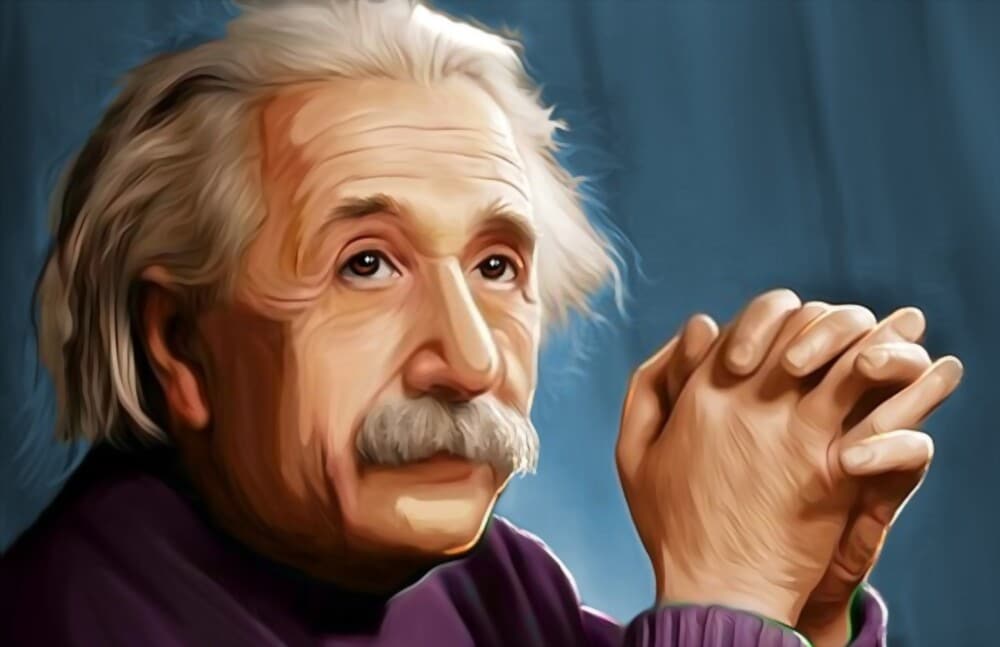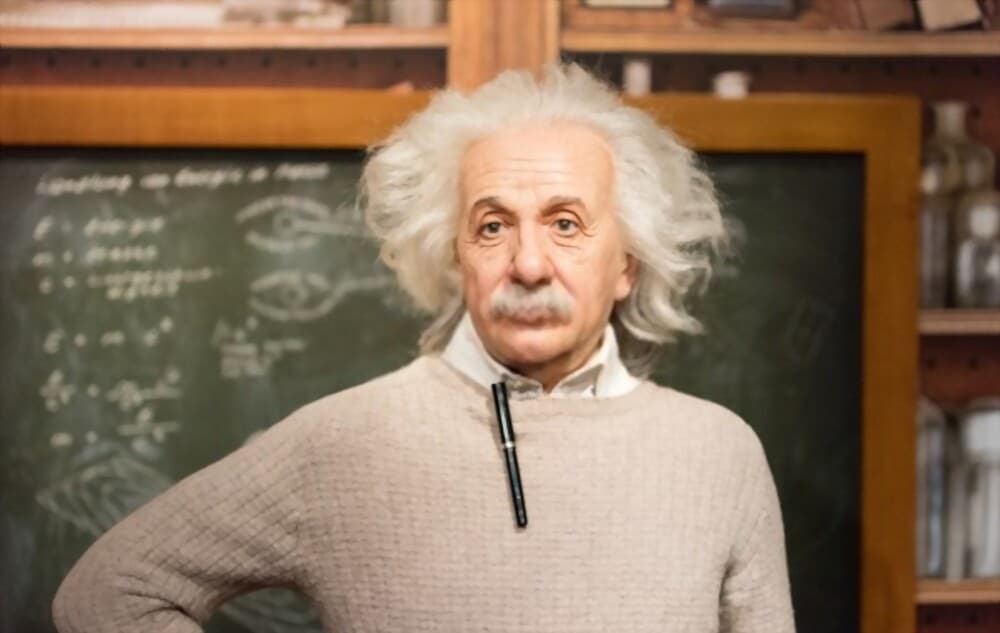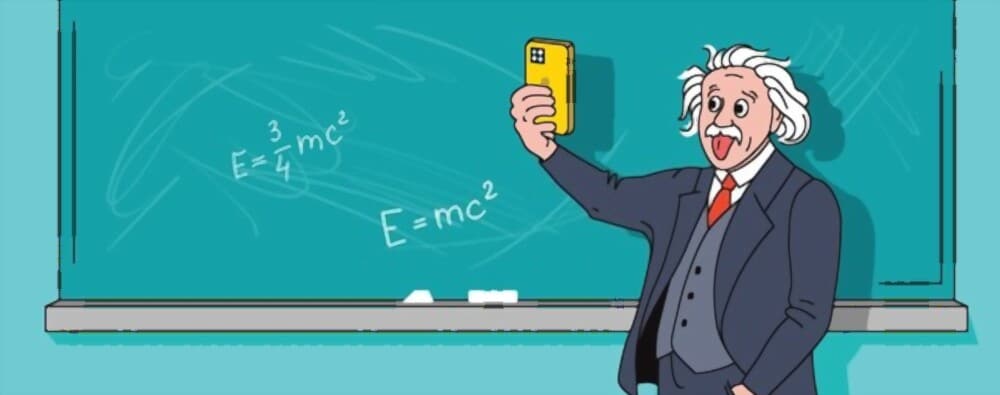
Albert Einstein, the renowned physicist, and Nobel laureate, needs no introduction. His name alone carries an air of intelligence and innovation. He has inspired generations of scientists, inventors, and thinkers. In this blog post, we’ll explore various descriptive paragraph on Einstein’s life and achievements in different word counts from 100 to 500 + words.
Taking the information given below in the input, develop it into a paragraph (100-150 words). You can invent your own details.
Hints:
Einstein — emigrated to the USA in 1933 —Nazi in Germany — could make atom bomb — letter to Roosevelt — warning of destruction — atom-bomb dropped on Japanese cities — Einstein deeply shook — advocated a world government — against war campaigned for peace and democracy — a great scientist — a visionary.
Ans. Einstein – A Great Visionary
Einstein had to leave Germany. The Nazis came to power. He migrated to the United States of America in 1933. Discovery of nuclear fission in Berlin shook the World. The Nazis could develop an atom-bomb that could cause utter loss of human lives and property. The USA developed the atomic bomb and dropped it on Hiroshima and Nagasaki in 1945. Einstein was deeply shaken by the extent of destruction caused by the bomb. He campaigned for peace and democracy. He hated war and arms build-up. He advocated for the formation of a world government. He was not only a scientific genius but a great visionary. This world citizen breathed his last in 1955.
Download the above Paragraph in PDF (Printable)
Descriptive Paragraph on Einstein- 100 Words
Albert Einstein was man of incredible intellect and imagination. He is among the most celebrated scientific minds in human history. He was born in Germany in 1879. He developed an early interest in science and mathematics which led him to study physics at university.
Einstein’s contributions to the field of physics are numerous and wide-ranging. He is best known for his theory of relativity, which fundamentally altered our understanding of space and time. Additionally, he made important advances in quantum mechanics, statistical mechanics, and cosmology.
Einstein was more than just a brilliant scientist; he was also a philosopher. He solved some of the deepest questions about existence. His views on religion were complex.
Einstein was also politically active throughout his life. He remains an inspiration to many today for his unwavering commitment to peace.

Also Read:
- An Ideal Teacher Paragraph
- My Best Friend Essay in English
- Essay on My Grandmother in English
- Essay on Traffic Jam
- Essay on Atma Nirbhar Bharat
Descriptive Paragraph on Albert Einstein Class 9- 150 Words
Einstein was a man of multiple talents. His great intellect made him one of the most brilliant minds in history. He had an insatiable curiosity about how the universe works, and he spent countless hours studying everything from physics to philosophy. He had the ability to think outside the box. He saw problems in ways that others couldn’t, and he often came up with innovative solutions. His creative ideas completely changed our understanding of the world around us. Despite his legendary status as a physicist, Einstein was also deeply committed to social justice and political activism. He spoke out against war and oppression, and he used his platform as a famous scientist to advocate for peace and equality.
Overall, Einstein’s legacy is one that continues to inspire people around the world today. His contributions to science have revolutionized our understanding of the universe, while his commitment to social justice serves as a reminder of how important it is for all of us to use our talents for good.
Descriptive Paragraph on Albert Einstein in 200 Words-
Albert Einstein was a genius, known for his exceptional contributions to physics and mathematics. He is widely regarded as one of the most influential scientists in history. But beyond his scientific achievements, he also had a unique personality that fascinated people around him.
Einstein was often seen wearing mismatched socks and disheveled hair, which gave him an endearing charm. All these habits made him stand out from other academics of his time. His unconventional approach to life extended to his work too. He believed in thinking outside the box and breaking conventions to discover new ideas. However, what truly sets Einstein apart is how he saw the world around him.
He believed that imagination is more important than knowledge, stating that-
“Logic will get you from A to B. Imagination will take you everywhere.”
This philosophy allowed him to come up with some of the most groundbreaking theories like the Theory of Relativity.
In conclusion, Albert Einstein’s brilliance went beyond just being intelligent or hardworking; it was about having an open mind and embracing creativity in all aspects of life. His legacy continues today as we continue to learn from his insights into science and human nature alike. There are a number of young and grown scientists who think him to be their ideal.

Paragraph on Albert Einstein in 300 Words –
Albert Einstein is a synonymous name with genius. He changed the landscape of science and our perception of the universe forever. His profound contributions to physics and mathematics revolutionized our understanding of fundamental concepts. Einstein’s theory of relativity and gravity changed many definitions given earlier by scientists. By introducing the groundbreaking equation E=mc², he revealed the intricate relationship between energy and matter, unraveling the mysteries of the cosmos.
He had a remarkable ability to think beyond conventional boundaries. His imaginative and unconventional approach to problem-solving allowed him to conceptualize ideas that were often dismissed by others. emphasized the critical role of creative thinking in scientific exploration. Einstein saw science as an art form, a realm where the power of imagination could break new ground and push the boundaries of human understanding.
Einstein was a great supporter of civil rights, challenging discrimination and inequality based on race or religion. His unwavering dedication to humanitarian values resonated with people worldwide, earning him admiration not only as a scientific genius but also as a moral compass.
Albert Einstein’s legacy continues to inspire and shape the scientific community and society at large. His innovative thinking and willingness to question the status have paved the way for countless scientific advancements. Einstein’s impact encourages discipline, as his ideas have influenced not only physics but also philosophy, art, and even popular culture.
His iconic image and renowned equations remain symbols of scientific excellence, reminding us of the power of human intellect and the limitless possibilities of the human mind.
In conclusion, Albert Einstein’s contributions to science and society are unparalleled. His theories and insights continue to shape our world, pushing the boundaries of knowledge and inspiring future generations to pursue scientific inquiry with curiosity, imagination, and a commitment to the greater good.
Einstein’s genius and his profound understanding of the interconnectedness of the universe have left an indelible mark on human history and will continue to inspire awe and wonder for generations to come.
Descriptive Paragraph on Albert Einstein- 500 + Words
Albert Einstein is one of the most renowned scientists in history. His name has become synonymous with genius. His contributions to the world of science are unique. His legacy continues to inspire generations of thinkers and innovators. Let’s delve deeper into who Albert Einstein was, his major accomplishments, famous quotes, how he contributed to the field of science and what made him such a great thinker.
Who was Albert Einstein?
Albert Einstein was a German-born physicist who is widely regarded as one of the most brilliant minds in human history. He was born in 1879 and spent his early years studying physics and mathematics at various universities across Europe.
Despite facing many obstacles, including anti-Semitism, Einstein persevered and went on to develop groundbreaking theories that revolutionized our understanding of space, time, energy, and matter. His most famous theory – the Theory of Relativity – challenged Newtonian physics by suggesting that time is relative to an observer’s point of view.
Einstein also played a key role in developing the concept of quantum mechanics which explains how subatomic particles behave. This field has since become crucial for modern technology such as computer chips and telecommunications devices.
Aside from his scientific contributions, Albert Einstein was also an outspoken pacifist who opposed war and violence. He believed that science could be used for peaceful purposes rather than destruction if it were applied with wisdom.
Ultimately, Albert Einstein’s legacy lives on today through both his scientific achievements and his commitment to creating a better world for everyone.
Einstein’s Contributions to Science
Albert Einstein’s contributions to science are revolutionary. Among his many achievements, he is best known for developing the theory of relativity which fundamentally changed our understanding of space and time. His work in this area helped scientists better understand gravity and led to new discoveries in astrophysics.
Einstein was also a pioneer in quantum mechanics, which deals with the behavior of matter and energy on the smallest scales. He introduced the concept of wave-particle duality, demonstrating that light behaves like both a wave and a particle depending on how it is observed.
Another significant contribution from Einstein was his famous equation E=mc², which relates mass to energy. This formula paved the way for nuclear physics and ultimately led to the development of atomic bombs during World War II.
Albert Einstein’s contributions to science have had an immeasurable impact on our world today. From space exploration to medical technology, his ideas continue to shape modern scientific thinking and inspire new innovations every day.

His Famous Quotes
Albert Einstein is known not only for his contributions to science but also for his witty and thought-provoking quotes. One of his famous quotes that is still relevant today is,
“Imagination is more important than knowledge.”
This quote highlights the importance of creativity and innovation in solving problems.
Another one of Einstein’s well-known quotes is,
“The definition of insanity is doing the same thing over and over again and expecting different results.”
This quote stresses the need for change and adaptation to achieve progress.
Einstein was also a proponent of living a simple life. He once said,
“Out of clutter, find simplicity. From discord, find harmony. In the middle of difficulty lies opportunity.”
This quote encourages individuals to focus on what’s truly important in life rather than getting caught up in material possessions.
Einstein believed strongly in perseverance despite setbacks. He famously stated,
“I have no special talent; I am only passionately curious.”
This quote reflects his belief that success comes not just from innate ability but also from hard work and determination. These famous quotes by Albert Einstein continue to inspire people around the world with their timeless wisdom.
Einstein’s Legacy
Albert Einstein’s impact on science and society can still be felt today, decades after his passing. His groundbreaking work in the field of physics revolutionized our understanding of the universe and paved the way for countless scientific advancements.
However, Einstein’s legacy extends far beyond just his scientific contributions. He was a champion of peace and social justice, using his platform to speak out against war and discrimination. He even advocated for the creation of a world government that could help prevent conflicts between nations.
Einstein also had an enduring influence on popular culture, with his wild hair and quirky personality becoming iconic symbols of intelligence and creativity. His name has become synonymous with genius, inspiring countless individuals to pursue careers in science or other fields where they hope to make a similarly lasting impact.
Albert Einstein’s legacy is one that will continue to shape our world for generations to come.
What are Some of Major Accomplishments of Einstein?

Theory of General Relativity: Revolutionizing Space and Time Understanding. Albert Einstein’s groundbreaking work on the theory of general relativity reshaped our comprehension of space and time.
This theory postulates that gravity arises from the curvature of spacetime caused by massive objects, providing a new framework for understanding the universe.
Nobel Prize for the Photoelectric Effect: Shedding Light on Quantum Mechanics
Einstein’s research on the photoelectric effect demonstrated that light can exhibit both particle and wave-like behavior.
His findings provided crucial evidence for the emerging field of quantum mechanics, which fundamentally altered our understanding of the microscopic world.
Contributions to Technology during World War II: Radar and Sonar Development
In addition to his scientific pursuits, Einstein actively contributed to the war effort during World War II. He collaborated with fellow scientists to develop technologies such as radar and sonar, which played a vital role in the Allies’ victory.
Advocate for Peace and Civil Rights: Using his Influence for Social Justice
Albert Einstein leveraged his prominence to champion peace and civil rights causes.
Throughout his life, he vehemently spoke out against racial and religious discrimination, promoting equality and social harmony.
Einstein supported organizations working towards international cooperation and the elimination of barriers that divide humanity.
Legacy and Iconic Status: Transcending Generations
Einstein’s significant achievements extended beyond scientific breakthroughs; he became an icon whose influence spans generations.
His scientific discoveries and advocacy for social justice continue to inspire and shape the way we perceive the world.
Albert Einstein’s multidimensional legacy serves as a reminder that individuals can have a profound impact on both scientific progress and the pursuit of a fair and equitable society.
How did he contribute to the world of science?
Albert Einstein’s contributions to the world of science are immeasurable. His groundbreaking theories and discoveries revolutionized our understanding of the universe. One of his most famous contributions was the theory of relativity, which fundamentally changed how we conceptualize space and time.
1.Einstein’s Work on the Photoelectric Effect: Unveiling Light and Energy Principles
• Albert Einstein’s contributions to quantum mechanics were significant, particularly regarding the photoelectric effect.
• His research helped establish fundamental principles about the behavior of light and energy, which continue to be integral to scientific understanding today.
• The photoelectric effect experiments demonstrated that light can transfer energy in discrete packets called photons, challenging previous assumptions about the nature of light.
2.A Paradigm-Shifting Approach: Challenging Conventions and Encouraging Creativity
•Einstein’s scientific inquiries left a lasting impact on the field, extending beyond his specific achievements.
•He encouraged a mindset of curiosity, creativity, and unconventional thinking, which revolutionized not only physics but also broader scientific disciplines.
•By questioning established beliefs and exploring new avenues, Einstein paved the way for innovative approaches to problem-solving that continue to shape scientific progress.
3.An Icon for Scientists: Intellectual Rigor and Humanistic Values
•Beyond his technical accomplishments, Albert Einstein became an icon revered by scientists worldwide.
•He embodied the fusion of intellectual rigor with humanistic values, inspiring a generation of researchers to pursue scientific excellence while also considering the broader implications of their work.
•Einstein’s commitment to social justice, particularly his advocacy for pacifism, garnered respect and admiration not only within academic circles but also among society at large.
4.Inspiring Future Generations: Bold Thinking and Novel Solutions
•Albert Einstein’s influence extends beyond his individual discoveries; he served as a beacon of inspiration for generations of scientists.
•His legacy encourages scientists to think boldly, challenge conventional wisdom, and seek innovative solutions to complex problems.
•Einstein’s unwavering commitment to scientific exploration and his pursuit of a better world continues to motivate and guide scientists in their quest for knowledge and positive change.
What made him such a great thinker?
Albert Einstein’s greatness as a thinker can be attributed to various factors. One of the most significant was his ability to visualize complex concepts and theories. He had an uncanny talent for creating mental images that allowed him to understand the inner workings of the universe in ways that others couldn’t.
Another factor that made Einstein such a brilliant thinker was his willingness to question everything, even established scientific beliefs. This led him down paths of inquiry that other scientists had not explored before, which ultimately resulted in many groundbreaking discoveries.
Einstein also possessed excellent problem-solving skills, particularly when it came to theoretical physics. He used creative thinking and logical deduction to come up with innovative solutions that often defied traditional scientific thought.
Moreover, Einstein was incredibly curious about the world around him and never stopped learning or seeking new knowledge. His passion for science fueled his desire to understand how everything worked, from subatomic particles to galaxies far beyond our own.
Einstein’s humility was perhaps one of his greatest assets as a thinker. Despite being one of the most brilliant minds in history, he remained open-minded and receptive to feedback from others. He recognized that no single person could have all the answers and embraced collaboration with fellow thinkers as a means of advancing scientific understanding further.
In essence, Albert Einstein’s brilliance as a thinker stemmed from his unique combination of visualization skills, critical thinking ability, problem-solving prowess curiosity about life itself – all underpinned by modesty and openness towards exchanging ideas with peers.
Conclusion
Albert Einstein is a name that will forever be associated with the world of science and innovation. His contributions to physics have revolutionized our understanding of the universe and paved the way for many scientific advancements in modern times. The legacy he has left behind continues to inspire generations of scientists and thinkers alike.
Einstein’s exceptional intellect, unique perspective, and unconventional approach to problem-solving made him stand out from other great minds in history. He constantly challenged mainstream thinking, broke down barriers, and pushed boundaries beyond what was thought possible.
Albert Einstein truly deserves his place as one of the most renowned scientists in history. Through his work and ideas, he changed how we view ourselves as individuals living on this planet while expanding our views on what lies beyond it.